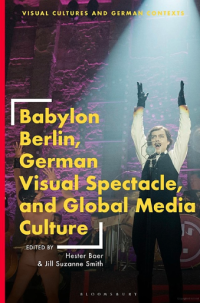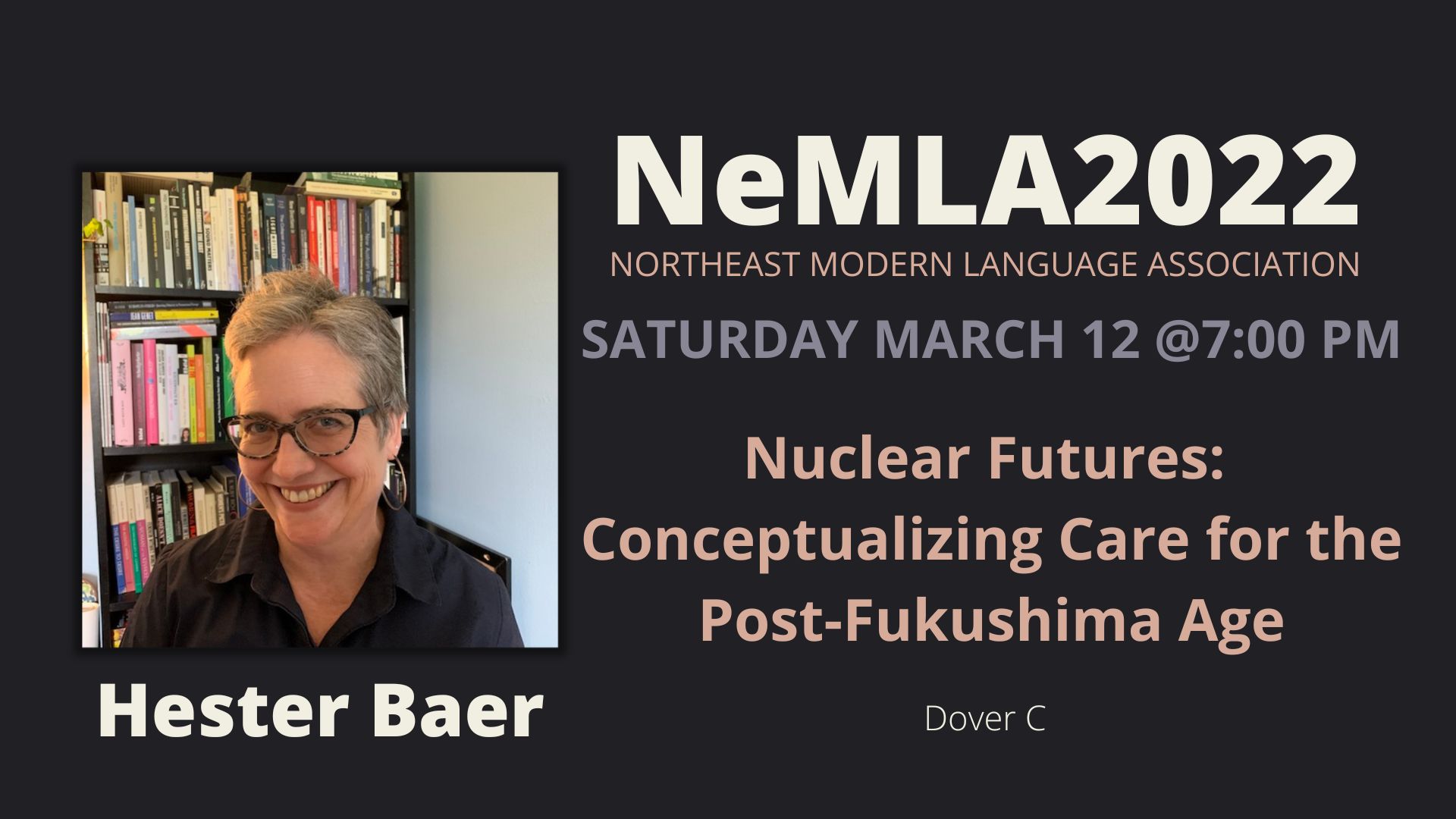Hester Baer

School of Languages, Literatures, and Cultures
Professor, Germanic Studies, German Studies
Affiliate Professor, The Harriet Tubman Department of Women, Gender, and Sexuality Studies
Affiliate Professor, Cinema and Media Studies
Global Culture & Thought
3207 Jiménez Hall
Get Directions
Research Expertise
Film studies
German Studies
Women's Literature and Feminist Theory
Dr. Hester Baer joined the faculty of the University of Maryland in Fall 2013 and currently serves as Department Head of German Studies. She is also a core faculty member in Cinema and Media Studies and Comparative Literature, and an affiliate faculty member in the Harriet Tubman Department of Women, Gender, and Sexuality Studies.
Professor Baer's research interests focus on German and European film and media; historical and contemporary feminisms; environmental humanities; and German literature and culture in the 21st Century. Her books include Dismantling the Dream Factory: Gender, German Cinema, and the Postwar Quest for a New Film Language (Berghahn, 2009); German Cinema in the Age of Neoliberalism (Amsterdam UP, 2021), and a monograph about postwar Germany's first feminist film, Ula Stöckl's The Cat Has Nine Lives (1968) for the series "German Film Classics" (Camden House, 2022). With Jill Suzanne Smith, Baer is the co-editor of the volume Babylon Berlin, German Visual Spectacle, and Global Media Culture (Bloomsbury, 2024). She is currently undertaking research, funded by an Insight Development Grant from the Social Sciences and Humanities Research Council of Canada (2022-24), for a new monograph, co-authored with Angelica Fenner, Feminist Film History Reframed: The Ulm Film School, 1962-68. Professor Baer previously served as co-editor of both Feminist German Studies (2019-21) and the German Quarterly, the flagship journal in the field (2022-24).
Baer's publications on feminisms in the German context include "Women's Film Authorship in Neoliberal Times: Revisiting Feminism and German Cinema" (2018), a special issue of Camera Obscura co-edited with Angelica Fenner; "Redoing Feminism: Digital Activism, Body Politics, and Neoliberalism" (Feminist Media Studies, 2015); and "Digital Feminisms and the Impasse: Time, Disappearance, and Delay in Neoliberalism," co-authored with Carrie Smith-Prei and Maria Stehle (Studies in 20th & 21st Century Literature, 2016). Baer has also served as the guest editor of a special issue of Studies in 20th & 21st Century Literature (2011), entitled "Contemporary Women's Writing and the Return of Feminism in Germany"; and a co-editor, with Alexandra Merley Stewart, of German Women's Writing in the Twenty-First Century (Camden House, 2015). Baer is the translator and co-editor, with Elizabeth Baer, of The Blessed Abyss: Inmate #6582 in Ravensbrück Concentration Camp for Women by Nanda Herbermann (Wayne State UP, 2000), originally published in Germany in 1946.
Together with Professor Michele M. Mason (Japanese, UMD), Baer co-organized a collaborative research and teaching project on the concept of futurity in the context of environmental activism and artistic engagement with atomic issues from 1945 to the present. Baer and Mason are co-editors of a volume, Nuclear Futures in the Post-Fukushima Age: Literature, Film, and Performance from Germany and Japan, published in the series Literatures, Cultures, and the Environment (Palgrave Macmillan, 2024).
Professor Baer received her Ph.D. in German from Washington University in St. Louis, where she also earned a graduate certificate in Women's Studies. Her education included a fellowship from the German Academic Exchange Service (DAAD) to conduct research in Berlin and exchange years in Tübingen and Vienna. After completing her degree, she spent a year at Duke University as the Lisa Lee and Marc Ewing Postdoctoral Fellow in German Studies and Women's Studies. Before coming to Maryland, Professor Baer taught German and Women’s and Gender Studies at the University of Oklahoma, where she was named Associates Second Century Presidential Professor. Baer has served as the President of the South Central Modern Language Association and as the President of the Coalition of Women in German. The recipient of a Fulbright award for travel to Germany in 2004, she spent summer 2012 in Berlin on a DAAD Research Visit Grant. In 2014-15, she held the Clara and Robert Vambery Distinguished Professorship of Comparative Studies at UMD and was a fellow at the Maryland Institute for Technology in the Humanities. From 2023-2025, she served as the University of Maryland's inaugural Mellon Humanities Fellow for the Big Ten Academic Alliance's Academic Leadership Program.
At the University of Maryland, Baer teaches a wide range of courses in German language, literature, and culture, film studies, and theory. Her recent undergraduate courses include "Thinking, Feeling, and Sensing: Film Theory and the Experience of Cinema," "Feminist Film and Media Theory," "New German Cinema," and "Babylon Berlin." Her graduate seminars include "German Literature in the 21st Century," "Weimar Culture," “All Power to the Imagination!: 1968 and German Culture,” and "Future Tense: Speculative Visions in German Culture."
Publications
A Blockbuster Art Film for the Neoliberal Age: Blank Style and 'Smart' Aesthetics in Maren Ade's Screwball Tragedy Toni Erdmann
This article examines Maren Ade's 2016 hit film Toni Erdmann, focusing on how the film develops a new formal language for representing the contemporary global economy.
Author/Lead: Hester BaerBuilding on previous scholarship about Ade's landmark film, I consider its remarkable representation of neoliberalism in tandem with its global success as a German comedy. The article offers a close reading of the film's interventions into cinematic form and genre, in particular its development of blank style and its resignification of the screwball comedy, elements that comprise a novel critical aesthetics. I argue that Toni Erdmann exemplifies the renewal of global art cinema for an ostensibly post-cinematic age.
Hester Baer publishes new co-edited volume with Bloomsbury Publishing
Congratulations to Dr. Hester Baer on her new co-edited volume Babylon Berlin, German Visual Spectacle, and Global Media Culture (Bloomsbury 2024)
Author/Lead: Hester Baer
The essays in this collection address the German television series Babylon Berlin and explore its unique contribution to contemporary visual culture.
Since its inception in 2017, the series, a neo-noir thriller set in Berlin in the final years of the Weimar Republic, has reached audiences throughout Europe, Asia, and the Americas and has been met with both critical and popular acclaim. As a visual work rife with historical and contemporary citations, Babylon Berlin offers its audience a panoramic view of politics, crime, culture, gender, and sexual relations in the German capital.
Focusing especially on the intermedial and transhistorical dimensions of the series, across four parts—Babylon Berlin, Global Media and Fan Culture; The Look and Sound of Babylon Berlin; Representing Weimar History; and Weimar Intertexts—the volume brings together an interdisciplinary and international group of scholars to critically examine various facets of the show, including its aesthetic form and citation style, its representation of the history and politics of the late Weimar Republic, and its exemplary status as a blockbuster production of neoliberal media culture.
Babylon Berlin, German Visual Spectacle, and Global Media Culture
The essays in this collection address the German television series Babylon Berlin and explore its unique contribution to contemporary visual culture.
Author/Lead: Hester BaerNon-ARHU Contributor(s): Jill Suzanne Smith
Since its inception in 2017 the series, a neo-noir thriller set in Berlin in the final years of the Weimar republic, has reached audiences throughout Europe, Asia, and the Americas and has been met with both critical and popular acclaim. As a visual work rife with historical and contemporary citations Babylon Berlin offers its audience a panoramic view of politics, crime, culture, gender, and sexual relations in the German capital.
Focusing especially on the intermedial and transhistorical dimensions of the series, across four parts-Babylon Berlin, Global Media and Fan Culture; The Look and Sound of Babylon Berlin; Representing Weimar History; and Weimar Intertexts-the volume brings together an interdisciplinary and international group of scholars to critically examine various facets of the show, including its aesthetic form and citation style, its representation of the history and politics of the late Weimar Republic, and its exemplary status as a blockbuster production of neoliberal media culture.
Considering the series from the perspective of a variety of disciplines, Babylon Berlin, German Visual Spectacle, and Global Media Culture is essential reading for students of film, TV, media studies, and visual culture on German Studies, History, and European Studies programmes.
Read More about Babylon Berlin, German Visual Spectacle, and Global Media Culture
German Cinema in the Age of Neoliberalism
This books presents a new history of German film from 1980-2010, focusing on its origins in and responses to advanced capitalism.
Author/Lead: Hester BaerThis book presents a new history of German film from 1980-2010, a period that witnessed rapid transformations, including intensified globalization, a restructured world economy, geopolitical realignment, and technological change, all of which have affected cinema in fundamental ways. Rethinking the conventional periodization of German film history, Baer posits 1980-rather than 1989-as a crucial turning point for German cinema's embrace of a new market orientation and move away from the state-sponsored film culture that characterized both DEFA and the New German Cinema. Reading films from East, West, and post-unification Germany together, Baer argues that contemporary German cinema is characterized most strongly by its origins in and responses to advanced capitalism. Informed by a feminist approach and in dialogue with prominent theories of contemporary film, the book places a special focus on how German films make visible the neoliberal recasting of gender and national identities around the new millennium.



